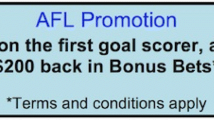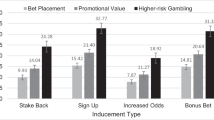Abstract
A proliferation of wagering advertising has raised concerns about its effects, especially on vulnerable gamblers. This study examined exposure to wagering advertisements and inducements, and their reported influence on the size, frequency and riskiness of bets placed—amongst regular bettors and by gambler risk group. An Ecological Momentary Assessment design minimised recall bias. After completing a baseline survey, 722 regular bettors completed up to 15 surveys administered on 5 days per week over three non-consecutive weeks. Data were analysed for the 316 race bettors and 279 sports bettors completing at least one survey. The results indicate that regular bettors have almost daily exposure to wagering advertising, including for inducements. The most frequently seen and influential advertisement types were direct messages (emails, texts and/or phone calls from wagering operators, which, in Australia, bettors are automatically opted-into when opening a betting account) and advertisements on betting websites or apps. Participants reported the most influential inducements to be: stake-back offers, multi-bet offers, match your stake or deposit offers, better odds/winnings inducements, happy hours, rewards programs, and cash out early offers. The findings indicate that wagering advertisements, including for inducements, are likely to be having powerful effects on regular bettors. On each day that respondents saw these advertisements (most days for most advertisement types), substantial minorities reported increased size and frequency of betting. Results did not vary by gambler risk group. Understanding which types of wagering advertising are associated with most gambling-related harm can inform advertising regulations, targeted public health interventions, and future research.
Similar content being viewed by others
References
Armstrong, A., & Carroll, M. (2017a). Sports betting in Australia. Melbourne: Australian Gambling Research Centre. Retrieved from: https://aifs.gov.au/agrc/publications/sports-betting-australia.
Armstrong, A., & Carroll, M. (2017b). Race betting in Australia. Melbourne: Australian Gambling Research Centre. Retrieved from: https://aifs.gov.au/agrc/publications/race-betting-australia.
Binde, P. (2014). Gambling advertising: A critical research review. London: Responsible Gambling Trust.
Ferris, J., & Wynne, H. (2001). The Canadian problem gambling index. Ottawa, ON: Canadian Centre on Substance Abuse.
Freedman, M. J., Lester, K. M., McNamara, C., Milby, J. B., & Schumacher, J. E. (2006). Cell phones for ecological momentary assessment with cocaine-addicted homeless patients in treatment. Journal of Substance Abuse Treatment, 30(2), 105–111.
Gainsbury, S. (2011). Player account-based gambling: Potentials for behaviour-based research methodologies. International Gambling Studies, 11(2), 153–171.
Gainsbury, S. M., Delfabbro, P., King, D. L., & Hing, N. (2016). An exploratory study of gambling operators’ use of social media and the latent messages conveyed. Journal of Gambling Studies, 32, 125–141.
Global Gaming and Betting Consultants. (GGBC; 2018). GBGC global gambling report, 13th edition. Retrieved from: https://www.gbgc.com/news/global-gambling-revenues-by-product.
Gordon, R., Gurrieri, L., & Chapman, M. (2015). Broadening an understanding of problem gambling: The lifestyle consumption community of sports betting. Journal of Business Research, 68(10), 2164–2172.
Haedt-Matt, A. A., & Keel, P. K. (2011). Revisiting the affect regulation model of binge eating: A meta-analysis of studies using ecological momentary assessment. Psychological Bulletin, 137(4), 660.
Hanss, D., Mentzoni, R. A., Griffiths, M. D., & Pallesen, S. (2015). The impact of gambling advertising: Problem gamblers report stronger impacts on involvement, knowledge, and awareness than recreational gamblers. Psychology of Addictive Behaviors, 29(2), 483–491.
Hing, N., Cherney, L., Blaszczynski, A., Gainsbury, S., & Lubman, D. (2014a). Do advertising and promotions for online gambling increase gambling consumption? An exploratory study. International Gambling Studies, 14(3), 394–409.
Hing, N., Gainsbury, S., Blaszczynski, A., Wood, R., Lubman, D., & Russell, A. (2014b). Interactive gambling. Melbourne: Gambling Research Australia.
Hing, N., Lamont, M., Vitartas, P., & Fink, E. (2015a). How sports bettors respond to sports-embedded gambling promotions: Implications for compulsive consumption. Journal of Business Research, 68, 2057–2066.
Hing, N., Lamont, M., Vitartas, P., & Fink, E. (2015b). Sports-embedded gambling promotions: A study of exposure, sports betting intention and problem gambling amongst adults. International Journal of Mental Health and Addiction, 13(1), 115–135.
Hing, N., Russell, A. M. T., Lamont, M., & Vitartas, P. (2017a). Bet anywhere, anytime: An analysis of Internet sports bettors’ responses to gambling promotions during sports broadcasts by problem gambling severity. Journal of Gambling Studies, 33, 1051–1065.
Hing, N., Russell, A. M. T., Li, E., & Vitartas, P. (2018). Does the uptake of wagering inducements predict impulse betting on sport? Journal of Behavioural Addictions, 7(1), 146–147.
Hing, N., Sproston, K., Brading, R., & Brook, K. (2015c). Review and analysis of sports and race betting inducements. Melbourne: Victorian Responsible Gambling Foundation.
Hing, N., Sproston, K., Brook, K., & Brading, R. (2017b). The structural features of sports and race betting inducements: Issues for harm minimisation and consumer protection. Journal of Gambling Studies, 33(2), 685–704.
Hing, N., Vitartas, P., & Lamont, M. (2013). Gambling sponsorship of sport: An exploratory study of links with gambling attitudes and intentions. International Gambling Studies, 13(3), 281–301.
Hing, N., Vitartas, P., & Lamont, M. (2014c). Promotion of gambling and live betting odds during televised sport: Influences on gambling participation and problem gambling. Brisbane: Report prepared for the Queensland Department of Justice and Attorney-General.
Hing, N., Vitartas, P., Lamont, M., & Fink, E. (2014c). Adolescent exposure to gambling promotions during televised sport: An exploratory study of links with gambling intentions. International Gambling Studies, 14(3), 374–393.
Hopper, J. W., Su, Z., Looby, A. R., Ryan, E. T., Penetar, D. M., Palmer, C. M., et al. (2006). Incidence and patterns of polydrug use and craving for ecstasy in regular ecstasy users: An ecological momentary assessment study. Drug and Alcohol Dependence, 85(3), 221–235.
Humphreys, B. R., & Pérez, L. (2012). Who bets on sports? Characteristics of sports bettors and the consequences of expanding sports betting opportunities. Estudios de economía aplicada, 30(2), 579–597.
Hussong, A. M., Hicks, R. E., Levy, S. A., & Curran, P. J. (2001). Specifying the relations between affect and heavy alcohol use among young adults. Journal of Abnormal Psychology, 110(3), 449.
LaBrie, R., & Shaffer, H. J. (2011). Identifying behavioral markers of disordered internet sports gambling. Addiction Research & Theory, 19(1), 56–65.
Lamont, M., Hing, N., & Gainsbury, S. (2011). Gambling on sport sponsorship: A conceptual framework for research and regulatory review. Sport Management Review, 14, 246–257.
Lamont, M., Hing, N., & Vitartas, P. (2016). Affective responses to gambling promotions during televised sport: A qualitative analysis. Sport Management Review, 19(3), 319–331.
Litt, M. D., Cooney, N. L., & Morse, P. (2000). Reactivity to alcohol-related stimuli in the laboratory and in the field: Predictors of craving in treated alcoholics. Addiction, 95(6), 889–900.
Lopez-Gonzalez, H., Estévez, A., & Griffiths, M. D. (2017a). Marketing and advertising online sports betting: A problem gambling perspective. Journal of Sport and Social Issues, 41(3), 256–272.
Lopez-Gonzalez, H., Estévez, A., & Griffiths, M. D. (2017b). Controlling the illusion of control: A grounded theory of sports betting advertising in the UK. International Gambling Studies, 18, 39–55. https://doi.org/10.1080/14459795.2017.1377747.
Lopez-Gonzalez, H., & Griffiths, M. D. (2016). Understanding the convergence of markets in online sports betting. International Review for the Sociology of Sport, 1–17. https://doi.org/10.1177/1012690216680602.
Lopez-Gonzalez, H., & Griffiths, M. D. (2017a). ‘Cashing out’ in sports betting: Implications for problem gambling and regulation. Gaming Law Review, 21(4), 323–326.
Lopez-Gonzalez, H., & Griffiths, M. D. (2017b). Betting, Forex trading, and fantasy gaming sponsorships: A responsible marketing inquiry into the ‘gamblification’ of English football. International Journal of Mental Health and Addiction, 16, 1–16.
Milner, L., Hing, N., Vitartas, P., & Lamont, M. (2013). An exploratory study of embedded gambling promotion in Australian football television broadcasts. Communication, Politics and Culture, 46, 177–198.
Newall, P. W. S. (2015). How bookies make your money. Judgment and Decision Making, 10(3), 225–231.
Newall, P. W. S. (2017). Behavioral complexity of British gambling advertising. Addiction Research & Theory, 25(6), 505–511.
Podesta, J., & Thomas, A. (2017). Betting restrictions and online wagering in Australia: A review of current knowledge. Melbourne: Australian Gambling Research Centre, Australian Institute for Family Studies.
Responsible Gambling Council (RGC). (2013). Responsible gambling best practices for player incentives: Land-based venues. Toronto: Responsible Gambling Council.
Russell, A. M. T., Hing, N., Browne, M., & Rawat, V. (2018). Are direct messages (texts and emails) from wagering operators associated with betting intention and behaviour? An ecological momentary assessment study. Journal of Behavioral Addictions, 24, 1–8. https://doi.org/10.1556/2006.7.2018.99.
Shiffman, S., Gwaltney, C. J., Balabanis, M. H., Liu, K. S., Paty, J. A., Kassel, J. D., et al. (2002). Immediate antecedents of cigarette smoking: an analysis from ecological momentary assessment. Journal of Abnormal Psychology, 111(4), 531.
Shiffman, S., Stone, A. A., & Hufford, M. R. (2008). Ecological momentary assessment. Annual Review of Clinical Psychology, 4, 1–32.
Sproston, K., Hanley, C., Brook, K., Hing, N., & Gainsbury, S. (2015). Marketing of sports betting and racing. Melbourne: Gambling Research Australia.
Thaler, R. H., & Sunstein, C. R. (2008). Nudge: Improving decisions about health, wealth, and happiness. New Haven, CT: Yale University Press.
Acknowledgements
Financial support to conduct this study was received from the Victorian Responsible Gambling Foundation.
Funding
This study was funded by the Victorian Responsible Gambling Foundation.
Author information
Authors and Affiliations
Corresponding author
Ethics declarations
Conflict of interest
Nerilee Hing has received research grants from the Australian Research Council, Gambling Research Australia, the Queensland Government, NSW Government, South Australian Government, Victorian Government, Victorian Responsible Gambling Foundation, the Australian Communications and Media Authority, the Alberta Gambling Research Institute, and the Australian National Research Organisation for Women’s Safety. She has conducted unpublished consultancy work for Echo Entertainment, Singapore Pools and Sportsbet aimed at improving their responsible gambling practices. She declares no conflict of interest in relation to this manuscript. Alex M. T. Russell has received research grants from Gambling Research Australia, the Victorian Responsible Gambling Foundation, the Queensland Government, the Alberta Gambling Research Institute, and the National Association of Gambling Studies. He has conducted unpublished consultancy work for Echo/Star Entertainment, aimed at improving their responsible gambling practices in relation to gambling by their employees. He declares no conflict of interest in relation to this manuscript. Anna Thomas has received research grants from Gambling Research Australia, Victorian Responsible Gambling Foundation and the Victorian Government. She has been paid to conduct peer reviews for Gambling Research Australia and the Victorian Responsible Gambling Foundation. She declares no conflict of interest in relation to this manuscript. Rebecca Jenkinson has received research grants from the Victorian Responsible Gambling Foundation, the Victorian Government, the Australian Government Department of Health, the Australian Government Department of Social Services, the National Health and Medical Research Council, the National Drug Law Enforcement Fund, Australia’s National Research Organisation for Women’s Safety, and the Invergowrie Foundation. She works at the Australian Gambling Research Centre which is funded by the Australian Government. She declares no conflict of interest in relation to this manuscript.
Human and Animals Rights Statement
All procedures performed in studies involving human participants were in accordance with the ethical standards of the institutional and/or national research committee and with the 1964 Helsinki declaration and its later amendments or comparable ethical standards.
Additional information
Publisher's Note
Springer Nature remains neutral with regard to jurisdictional claims in published maps and institutional affiliations.
Rights and permissions
About this article
Cite this article
Hing, N., Russell, A.M.T., Thomas, A. et al. Wagering Advertisements and Inducements: Exposure and Perceived Influence on Betting Behaviour. J Gambl Stud 35, 793–811 (2019). https://doi.org/10.1007/s10899-018-09823-y
Published:
Issue Date:
DOI: https://doi.org/10.1007/s10899-018-09823-y




